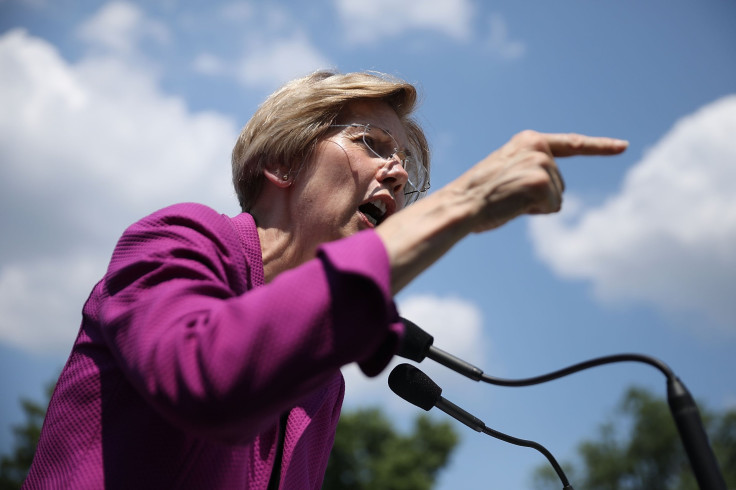5 Key Takeaways From The Second Democratic Debate
Democratic presidential hopeful took the stage on the first night of a combative primary debate on Tuesday. Ten candidates took part in the debate, including progressive flag-bearers Sen. Bernie Sanders (I-Vt.) and Sen. Elizabeth Warren (D-Mass.).
The low-polling candidates like former Maryland Congressman John Delaney and Montana Gov. Steve Bullock hoped to break through into the crowded field by trying to confront the top-tier candidates. While not entirely successful they did manage to draw some attention.
Here are some of the key takeaways from Tuesday’s Democratic Primary debate:
Interparty ideological rifts come to the fore:
The ideological differences between the Democratic presidential candidates was laid bare in the debate. Sanders and Warren came under criticism for their progressive ideologies from the centrist candidates.
The massive ideological divide in the Democratic Party was on full display in Detroit debate https://t.co/1Ve98Danjn pic.twitter.com/3ZSfvbBRHv
— CNN Politics (@CNNPolitics) July 31, 2019
Delaney expressed his dislike for the progressive policies and bluntly stated that “we cannot go down the road that Sen. Sanders and Sen. Warren want to take us.”
Former Colorado Gov. John Hickenlooper, Montana Gov. Bullock and Rep. Tim Ryan (D-Ohio), too, took swipes at the progressive candidates, criticizing their policies especially in the healthcare sector.
They said taking a far-left position would eventually lead them to being branded as socialists by the Republicans.

Sanders and Warren jointly beat the critics
Progressive democrats Sanders and Warren were undoubtedly the standout performers as they managed to swat at their critics together. Both came under fire from the moderate hopefuls for their progressive approach and policies. But both gave bold replies to their critics.
Everybody can go home. Elizabeth Warren just won the night:
— Ryan Knight ☭ (@ProudSocialist) July 31, 2019
"I don't understand why anybody goes to all the trouble of running for President of the United States just to talk about what we really can't do and shouldn't fight for.”#DemDebate #Warren2020 pic.twitter.com/0GnUlXpO1n
Warren managed to draw the loudest cheers on the night when she replied to Delaney’s argument, saying, “I don't understand why anybody goes to the trouble of running for president of the United States just to talk about what we really can't do and shouldn't fight for.”
Sanders and Warren jointly defended their policies, instead of going at each other as was expected.
Williamson’s 'Dark Psychic Force' comment keeps her in the race
Author Marianne Williamson took aim at President Trump, talking of a ‘Dark Psychic Force” while highlighting the issues related to race and bigotry.
The Detroit crowd erupted and the comment managed to break the internet, ensuring that Williamson would stick around in the race. Her unique style and new age-lingo helped her become an internet sensation and might propel her into the fall debate at the cost of some traditional candidates.
Bullock and Delaney manage to draw some attention
Bullock, who had failed to qualify for the first debate, fully understood that this was the last big chance to leave a mark in the mind of voters and managed to do exactly the same. A centrist, Bullock made his views clear from his opening statement, blasting the “wish-list economics” and the need to solve problems that were “here and now." He has managed to portray himself as a strong alternative to former Vice President Joe Biden.
Tonight, I shared my plan to give every American a fair shot.
— Steve Bullock (@GovernorBullock) July 31, 2019
Tomorrow, we keep up the fight. #DemDebate
Join us: https://t.co/P1MEjYHI9D pic.twitter.com/kq1w6ly2Vs
Delaney too has put himself on the map, after a strong showing on the first night of the debate. Delaney, who is among the primary’s lower tier candidates, managed to punch above his weight by clashing repeatedly with Sanders and Warren. Though Warren slam-dunked Delaney with her famous line, it ended up being a good debate for him.
Sen. Amy Klobuchar and South Bend, Ind., Mayor Pete Buttigieg, did advance some interesting points in the debate.
Healthcare takes centre-stage
About 30 minutes of Tuesday night’s debate revolved around one subject, healthcare, and specifically, 'Medicare for All,' which drawing out the differences among the from the candidates on the topic. Sanders and Warren ferociously defended their Medicare for All, against criticism from multiple candidates.
The candidates also called out President Trump for his racist tweets. In light of the incidents of gun violence, the presidential hopefuls seemed to agree on the need to bring tougher gun laws, with several of them touching on their personal experiences with gun violence.
© Copyright IBTimes 2025. All rights reserved.





















